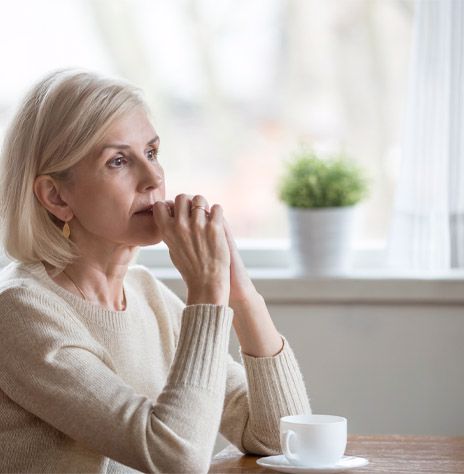After a mini stroke (TIA) or minor stroke, some people may experience anxiety and worry about having a stroke. There are many different ways of managing anxiety which can help you reduce its effects on your mental and physical wellbeing.

I referred myself for counselling because I can’t cope with the anxiety, I don’t want to feel anxious all my life…
TIA patient
How can I manage my anxiety?
There are self-management strategies, resources and organisations to help make things a little easier for you, some of them can be found below:
Self-management strategies are summarised in this infographic.
1. Reduce physical symptoms
The techniques below can help reduce physical symptoms, such as heart pounding, feeling sick, difficulty breathing and sweating:
Slow your breathing
Breathe in and out for the count of three. Repeat.
There are videos, and websites with guided breathing exercises.
Relaxation
You may already know what relaxes you, such as reading, walking or listening to music.
Some relaxation techniques need to be practiced, such as mindfulness. There are videos, websites, podcasts and apps to help with mindfulness.
Deep muscle relaxation
Gently tense and relax each part of your body. Tense for 3 seconds and then relax.
There are websites and audio tracks with guided muscle relaxation.
Distraction
Take your mind off your symptoms by distracting yourself for a least 3 minutes. For example:
- Sudoku/ crossword puzzles
- Count backwards from 1000
- Study something in detail, such as how many cars can you see.
2. Challenge anxious thoughts
Notice your anxious thoughts and challenge them.
For each anxious thought think of or write down a more balanced thought. It can be helpful to keep a diary of these thoughts. For example:
Anxious thought: "I don’t want to go to the supermarket because that’s where I had my mini stroke and I’m worried I’ll have another one."
Balanced thought: "The supermarket is not linked at all to my mini stroke."
There are worksheets to help you.
3. Face the things anxiety is making you avoid
Recognise when you are avoiding things due to your anxiety and gradually tackle this avoidance. It can be helpful to write a list of small goals:
For example: build up to going to a busy shop by yourself
-
Go for a walk by yourself
-
Go to a local shop by yourself
-
Meet a friend in a larger shop
-
Go to a large shop by yourself for a short amount of time.
Physical activity releases chemicals into your brain that make you feel happier. Exercise also helps you focus on one activity and distracts from anxious thoughts.
Even short walks and gardening can help. You’re more likely be active if you plan it, do something you enjoy or do it with family or friends.
Find out more about active lifestyle here
Talking to other people is really important.
Family and friends: sharing your feelings can help them understand what you are going through and how to support you.
Other people who have had mini stroke (TIA)/ minor stroke: connect through social media groups and forums.
Other people with anxiety: there are online forums for people with anxiety:
Helplines for anxiety or stroke:
Anxiety
Stroke
What treatments are there for anxiety?
Talk with your GP if you think you could benefit from more support.
Cognitive behavioural therapy (CBT) is a talking therapy which can help you manage anxiety by changing the way you think and behave. Read more about CBT.
There are different ways to access CBT:
NHS (note: wait times can be long):
- Your GP may be able to refer you to CBT in your area or give you a login for an online CBT programme.
- Self-refer: Search for NHS CBT here
Private sector (note: this can be expensive):
Find a therapist experienced in CBT
Online CBT:
You may want to talk to your GP about medication for anxiety.
-
Some antidepressants can help with anxiety.
-
Beta-blockers are sometimes used to treat the physical symptoms of anxiety, such as a rapid heartbeat. But they don't reduce any of the psychological symptoms.
-
Pregabalin is sometimes used when someone has a diagnosis of generalised anxiety disorder (GAD). This is an antiseizure drug which is normally used to treat epilepsy, but is also licensed to treat anxiety.
Discover more about the medication available
Helpful resources
Videos:
Apps:
Podcast:
Websites:
Challenge anxious thoughts
Online forums for people with anxiety:
Anxiety helplines:
Social media and forums for mini stroke (TIA) and minor stroke